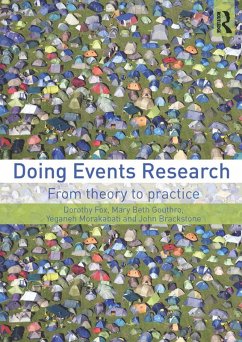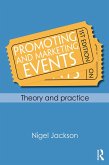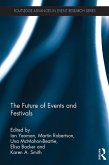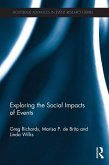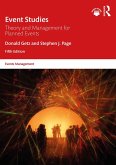Events Management is a rapidly expanding discipline with growing student numbers however currently there are no specifically focused Research Methods texts available to serve this growing cohort. Fulfilling the need for a relevant book which reflects the unique characteristics of research in the field this title provides students with innovative ideas and inspiration to undertake their own research work and informs them of the wide diversity of research strategies and contexts that are available.
Content is written from a researcher's point of view and provides a step by step guide to accomplishing a project or dissertation in the field of events. The reader is guided right from the beginning in selecting a topic for research, identifying aims, objectives and questions and then determining which research methods are the most appropriate and practical. They are then shown how to analyze and interpret their data as well as writing up the project.
Whilst many current texts are skewed either towards qualitative or quantitative methods, Doing Events Research provides a balanced coverage of both. It incorporates not only traditional research methods, but also contemporary techniques such as using social networking websites and Google analytics. Specific research case studies are integrated to make applications accessible to events students and show the unique characteristics of researching in this field. A range of useful learning aids spur critical thinking and further students' knowledge.
This book is visually accessible and whilst written in an engaging style nonetheless maintains academic rigor grounded in research and scholarship. This is essential reading for all events students.
Content is written from a researcher's point of view and provides a step by step guide to accomplishing a project or dissertation in the field of events. The reader is guided right from the beginning in selecting a topic for research, identifying aims, objectives and questions and then determining which research methods are the most appropriate and practical. They are then shown how to analyze and interpret their data as well as writing up the project.
Whilst many current texts are skewed either towards qualitative or quantitative methods, Doing Events Research provides a balanced coverage of both. It incorporates not only traditional research methods, but also contemporary techniques such as using social networking websites and Google analytics. Specific research case studies are integrated to make applications accessible to events students and show the unique characteristics of researching in this field. A range of useful learning aids spur critical thinking and further students' knowledge.
This book is visually accessible and whilst written in an engaging style nonetheless maintains academic rigor grounded in research and scholarship. This is essential reading for all events students.
Dieser Download kann aus rechtlichen Gründen nur mit Rechnungsadresse in A, B, BG, CY, CZ, D, DK, EW, E, FIN, F, GR, HR, H, IRL, I, LT, L, LR, M, NL, PL, P, R, S, SLO, SK ausgeliefert werden.

